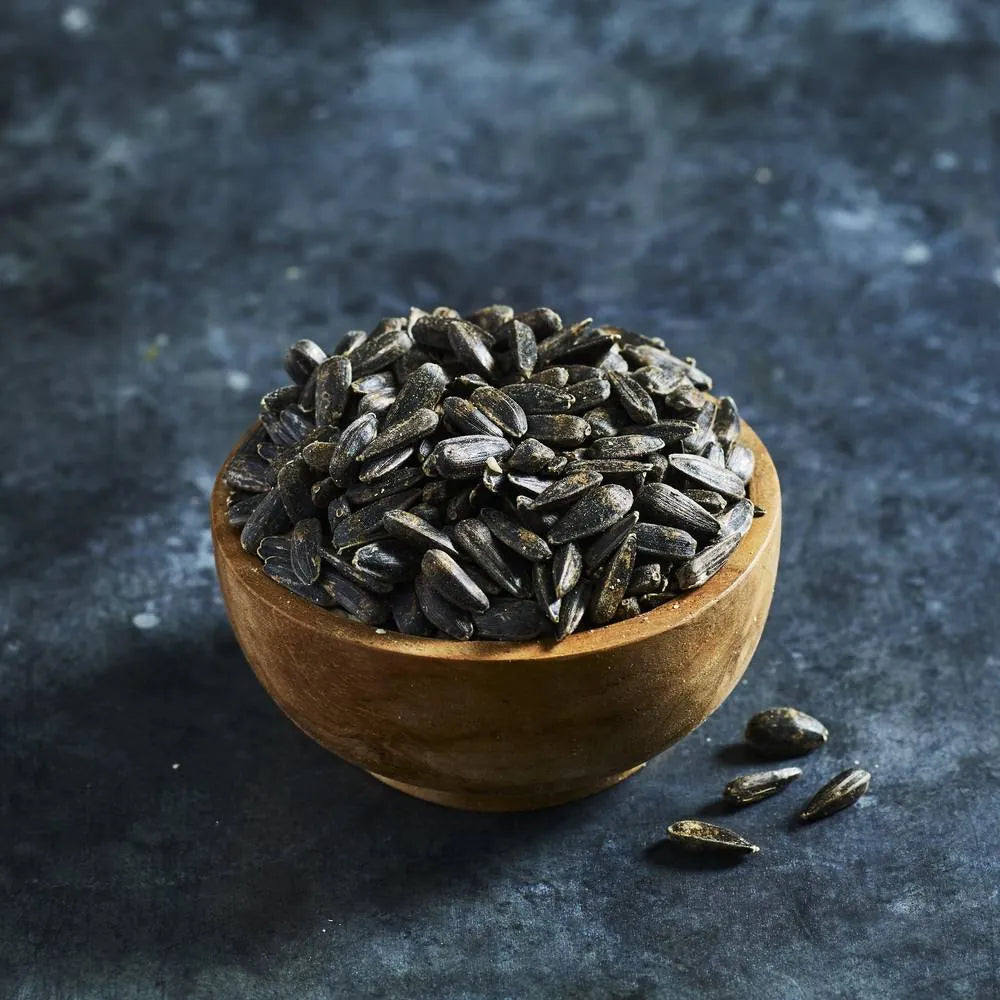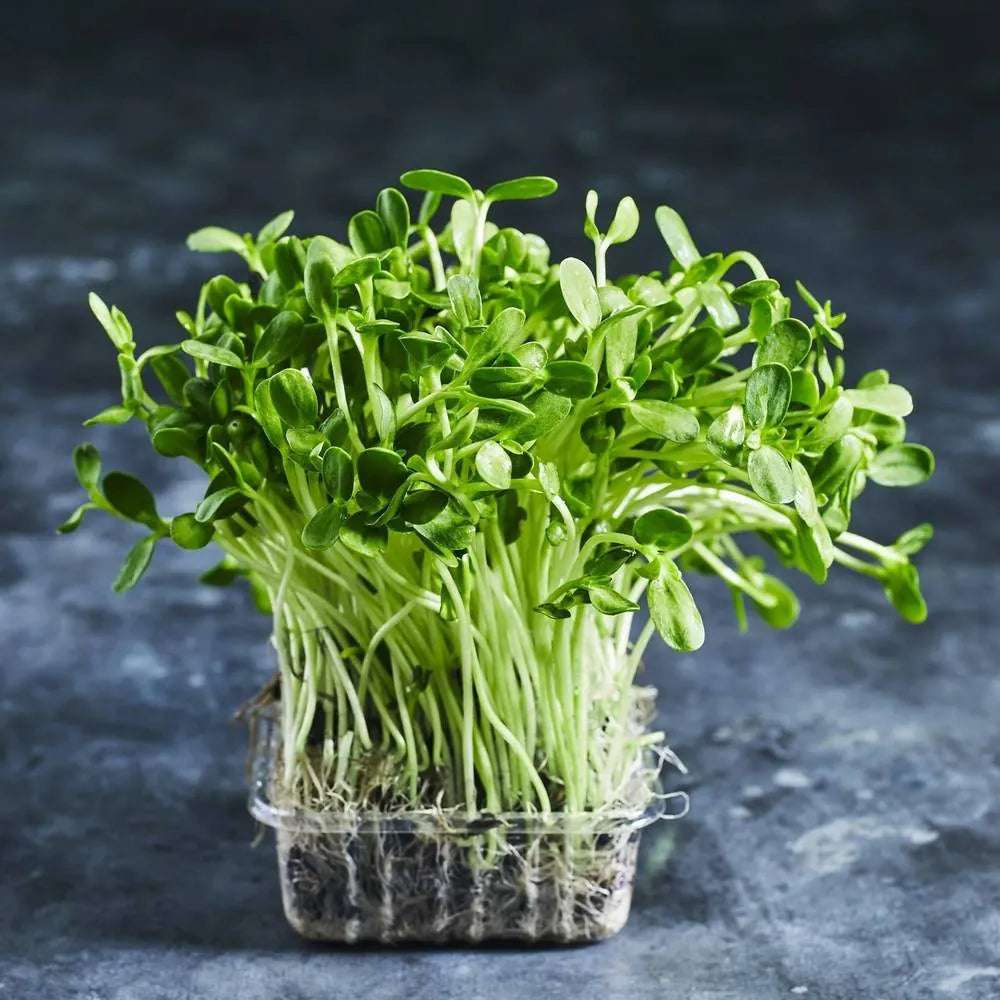Black Sunflower Sprouting Seeds – Available in Bulk
Our Black Sunflower Seeds are a versatile choice for sprouting nutrient-rich microgreens or growing tall, beautiful sunflowers in the garden. With a reliable germination rate and excellent flavour, these Australian-grown seeds are perfect for health enthusiasts, gardeners, and bulk buyers.
Why Choose Black Sunflower Seeds?
-
Dual-purpose – Grow as superfood microgreens or full-sized sunflowers
-
Fast results – Microgreens ready to harvest in 10–14 days
-
Nutrient-dense – Rich in protein, folate, potassium, and antioxidants
-
Natural & Non-GMO – Chemical-free, grown in Australia
-
Reliable germination – ~85% germination rate for consistent results
How to Grow Sunflower Microgreens
-
Soak seeds in cold water for 4 hours.
-
Spread evenly over coco fibre or soil in a tray and press lightly.
-
Mist and cover to maintain humidity; spritz twice daily.
-
Uncover after 4 days and switch to bottom watering.
-
Harvest in 10–14 days for crisp, nutty microgreens.
Multiple Uses
-
Microgreens – Fresh, crunchy sprouts with a nutty, lemony flavour for salads, wraps, or smoothies (must be grown as a microgreen, not in a jar)
-
Garden Blooms – Sow outdoors for tall sunflowers reaching up to 6 feet with stunning 30cm flower heads
Bring nutrition to your plate and beauty to your garden with these Black Sunflower Sprouting Seeds. Available in bulk for sprouters, growers, and gardeners who want both quality and value.
Live Rates – Weight & Destination Based
Shipping is automatically calculated at checkout based on your order’s weight and delivery address. We use real-time rates from Australia Post and other carriers to provide the most accurate cost.
Handling Time
Orders are packed and dispatched within 0–2 business days (Monday–Friday).
Estimated Delivery Time
Transit times depend on your location:
• Metro areas: usually 2–3 business days
• Regional/rural areas: 5–10 business days
• WA & TAS: may take longer due to state biosecurity inspections
Tracking
All orders include tracking. You’ll receive an email with your tracking link once your parcel has shipped.
Authority to Leave (ATL)
Couriers may leave parcels in a safe place if you are not home. Please provide delivery instructions at checkout if you prefer otherwise.
Pickup Option (Riverstone, NSW)
Please place your order on our website and select “Pick up” at checkout. Wait for us to contact you to confirm and arrange a pickup time. Do not come to our warehouse without an appointment — pickups are strictly by arrangement only. Allow 2–3 business days for preparation; we’ll notify you when your order is ready.
Biosecurity (WA & TAS)
Certain seeds are restricted under state biosecurity laws. Customers are responsible for ensuring products comply with local regulations. Please check with the WA Department of Primary Industries and Regional Development or the Tasmanian Department of Natural Resources and Environment before ordering.
For the full details, see our Shipping Policy.
No Change-of-Mind Returns
We do not accept returns or refunds for change-of-mind purchases.
No Exchanges
We do not accept product exchanges. All sales are final unless covered by Australian Consumer Law.
Your Rights Under Australian Consumer Law
Your ACL rights still apply. You’re entitled to a refund or replacement if your item is faulty, misdescribed, or incorrect. Please contact us within 7 days of delivery with your order number and photos if applicable. Once approved, we will provide a prepaid return label and process a refund or replacement. Refunds are issued to your original payment method within 10 business days.
90-Day Seed Germination Guarantee
If your seeds fail to germinate within 90 days of purchase, we will re-test the batch. If our test confirms poor germination, we will provide a refund or replacement. Seeds must be stored and used according to our instructions; please retain packaging or batch details if available.
For the full policy text you can also see our policy page at /policies/refund-policy.
Seed FAQ
Seeds don't expire, but their ability to sprout weakens over time. With proper storage, your seeds will remain viable for years, ensuring a high germination rate for every batch of fresh sprouts.
Key Storage Tips:
- ✅ Keep it Cool, Dry, and Dark: The best place to store seeds is in a location that's away from heat, light, and humidity.
- ✅ Use an Airtight Container: Jars or sealed bags are ideal. For extra protection against moisture, you can add a silica gel packet.
- ✅ Consider Refrigeration: For long-term storage, keeping seeds in the fridge or freezer is a great option. Just be sure to let them return to room temperature before you use them.
Sprouting Seed Viability Guide
Here's how long you can expect some of our most popular seeds to last when stored correctly:
- 1–2 Years: Mung beans, peas, lentils, and chickpeas.
- 3–4 Years: Alfalfa, radish, fenugreek, and mustard.
- 4–5 Years: Broccoli, wheatgrass, sunflower, buckwheat, and clover.
If you're unsure about older seeds, you can perform a simple germination test. Place a few seeds on a damp paper towel inside a sealed bag. Keep them moist and check the number of sprouts after 5–10 days to see if they are still viable.


